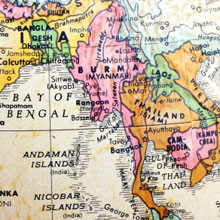
China's economy has grown by over 1000% since 1990. For similar growth opportunities, look no farther than Asia's frontier markets.
You may be reading quite a bit about China’s property bubble, higher manufacturing costs, slowing economic growth and its attempt to shift gears to a consumer-led economy.
What’s next for China is debatable, but there’s no question that it’s achieved tremendous progress in a short time.
For some perspective, China’s exports for the entire year of 1980 are equal to one day of exports in 2012! China’s economy of 1990 was equal to that of Taiwan – now it’s 12 times larger. At least 200 million Chinese have been pulled out of poverty.
You are probably thinking, “If only I could go back in time and invest in the China of 1980 or 1990.”
You can.
Just go to Asia’s new frontier of growth…
Asia’s New Frontier
These are countries that are 10 to 20 years behind China, such as Vietnam, Sri Lanka, Philippines, Indonesia, Cambodia, resource rich Mongolia and Papua New Guinea, and even Myanmar/Burma (more on this later).
Here’s a quick overview of the advantages of investing in frontier Asia.
- Faster Growth – Faster growth than emerging markets like Brazil, Russia, India and China.
- Youthful Population – 40% of the world’s 14 to 25 year olds are in frontier markets, while North America, Japan and Europe together make up only 10% of this key consumer group.
- Low Debt – On average, frontier markets have better balance sheets with only half the debt to GDP of developed markets.
- Integration With the Global Economy – cellphones and the internet have made “catch up” easier and faster.
- Attractive Market Valuations – Cheaper than both emerging and developed markets despite higher growth rates.
- Inefficient Markets – Offer experienced fund managers opportunities to pounce on bargains.
- Low Correlation to Other Markets – Frontier markets don’t move in tandem with emerging or developed markets, offering the potential for lower portfolio volatility.
The case for looking closely at these markets is compelling. This is why I’ll be covering these markets at the upcoming Investment U Conference in San Diego.
Frontier Market Snapshot
Here’s a snapshot of just some of the markets I’ll be talking about.
- Vietnam – Market Vectors Vietnam ETF (NYSE: VNM)
Vietnam’s market is on fire, up 20% so far in 2012.
Still, it offers good value as it evolves into one of Asia’s lowest-cost manufacturing hubs with wages about half that of China. With a 97% literacy rate and a youthful population of 87 million and ample natural resources, Vietnam offers huge potential if its government will only get out of the way.
- Indonesia – Aberdeen Indonesia Fund (AMEX: IF)
Indonesia has been one of my favorites for quite some time.
Three times the size of Texas, Indonesia is a democracy with the fourth-largest population in the world. The country is on a roll, fueled by better fiscal policies. It’s the only country in the G 20 (largest 20 economies in the world) to have declining government debt/GDP, which also has a balanced budget. Foreign investment and exports are rising and the country is home to natural resources such as oil, natural gas, coal, tin, rubber and palm oil.
The World Bank reports that Indonesia has the planet’s fastest-growing middle class, and they’re a savvy group. Indonesia represents the world’s third-largest user of Facebook, behind the United States and the U.K. Challenges include the need for much better infrastructure and confronting corruption.
- Myanmar/Burma
Burma is in transition to ending 50 years of economic and political isolation.
It was once one of the wealthiest countries in the region as a major port and source of natural resources. To get a feel for its potential, just look at neighboring Thailand, which has an economy 10 times larger. A beautiful country with many historical sites, the country’s biggest opportunity out of the box is tourism. While Thailand had more than 12 million visitors in 2011, Burma had only 200,000.
Despite my enthusiasm for frontier Asia, the biggest challenge, for me, so far has been finding easy ways to capture frontier Asia growth. Investing directly in frontier Asian companies is a daunting task for most investors, and frontier market funds have most of their assets in the Middle East and Africa.
This is why I’m so interested in learning more about Leopard Capital’s upcoming Leopard Asia Frontier Fund. I have watched Leopard’s progress in frontier Asian private equity with keen interest. I’m thinking this on-the-ground experience will give them a serious leg up on competitors.
I look forward to meeting those of you who are coming to San Diego. Don’t miss Leopard Capital CEO Doug Clayton’s speech on investing in frontier Asian markets.
Good Investing,
Carl Delfeld
Article by Investment U